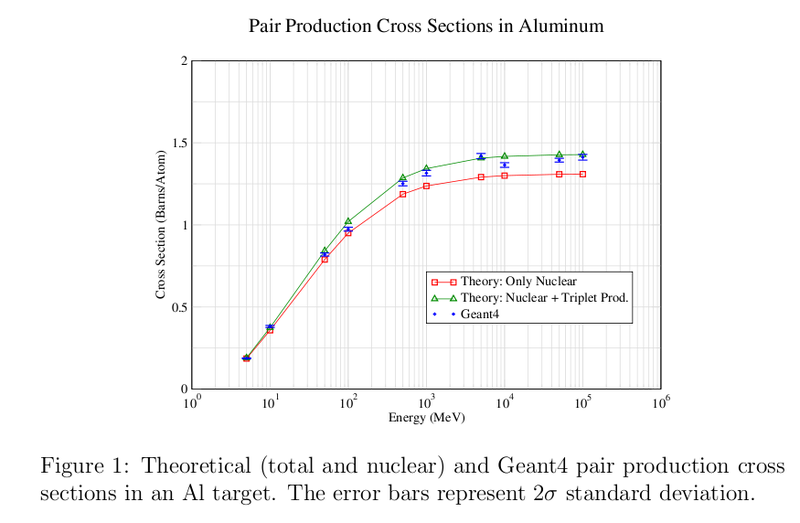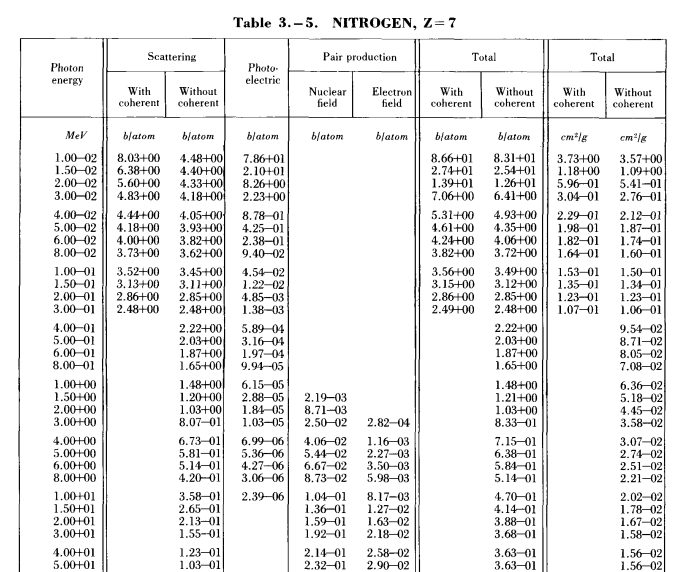Go Back
LINAC parameters used in calculations
1) pulse width 50 ps
2) pulse current 50 A
3) repetition rate 300 Hz
4) energy 44 MeV
Number of electrons/sec on radiator
[math] 50\ \frac{C}{sec} \times \frac{1\cdot e^-}{1.6\cdot 10^{-19}\ C} \times 50\ \mbox{ps} \times 300\ \mbox{Hz} = 0.47 \cdot 10^{13}\ \frac{e^-}{sec}[/math]
Number of photons/sec out of radiator
- [math]\sigma_{brems}=0.1\ \mbox{photons/electrons/MeV/r.l}[/math]
- [math]\mbox{r.l.(Ti)} = 3.59\ \mbox{cm}[/math]
- [math]\mbox{radiator}\ \mbox{thickness} = 12.5\ \mu m[/math]
[math]\frac{12.5\ \mu m}{3.59\ cm} = 3.48 \cdot 10^{-4}\ r.l.[/math]
[math]0.47 \cdot 10^{13} \frac{e^-}{sec} \times 0.1\ \frac{\gamma 's}{(e^- \cdot MeV \cdot r.l.)} \times 3.48 \cdot 10^{-4}\ r.l. \times 10\ MeV =1.63 \cdot 10^{9} \frac{\gamma}{sec}[/math]
Alex factor is 6.85 %
[math]1.63 \cdot 10^{9} \frac{\gamma}{sec} \cdot 6.85\ % = 1.12 \cdot 10^{8} \frac{\gamma}{sec}[/math]
Pair production rate
out of Al converter
[math]\sigma_{pairs} = 0.5\ \frac{\mbox{barns}}{\mbox{atom}}[/math]
[math]l = 3.0\ \mu m[/math] (by varying width we can vary the yield)
[math]N_{Al} = \frac{2.375\ \frac{g}{cm^3} \times 6.02 \cdot 10^{23}\ \frac{atoms}{mol} \times 3.0\ \mu m} {26.98\ \frac{g}{mol}} = 1.59 \cdot 10^{23}\ \frac{\mbox{atoms}}{m^2}[/math]
[math]\frac {1.12 \cdot 10^{8}\ \frac{\gamma}{sec} \times \sigma_{pairs} \times N_{Al}} {f} = 2.96\ \frac{\mbox{pairs}}{\mbox{pulse}} [/math]
through 1 m of air
Assume air consists entirely from Nitrogen:
[math]\sigma_{pairs}\ (\mbox{Nitrogen}) = 0.2\ \frac{\mbox{barns}}{\mbox{atom}}[/math] (better to plot and to check this number but it's maybe factor of 2)
[math]l = 1.0\ \mbox{m}[/math]
[math]N_{\mbox{Nitrogen}} = \frac{0.00125\ \frac{g}{cm^3} \times 6.02 \cdot 10^{23}\ \frac{atoms}{mol} \times 1.0\ \mbox{m}} {14.01\ \frac{g}{mol}} = 5.37 \cdot 10^{25}\ \frac{\mbox{atoms}}{m^2}[/math]
[math]\frac {1.12 \cdot 10^{8}\ \frac{\gamma}{sec} \times \sigma_{pairs} \times N_{Al}} {f} = 401\ \frac{\mbox{pairs}}{\mbox{pulse}} [/math]
Appendix
pair production cross sections in an Al target
Ref. Geant4 and Theoretical Pair Production Cross Sections for 1 MeV - 100 GeV photons in Aluminum. Vakho Makarashvili, December 18, 2007

pair production cross sections in Nitrogen
Ref. Photon Cross Section, Attenuation Coefficients, and Energy Absorption Coefficients From 10 keV to 100 Gev. J.H.Hubbell. Center for Radiation Research.National Bureau of Standards. Washington, D.C. 20234

800 px
Go Back

